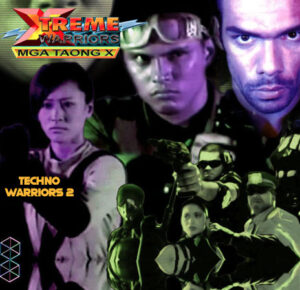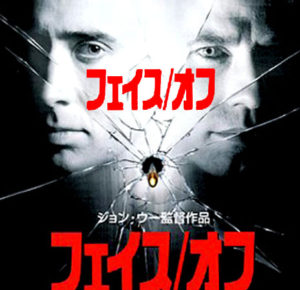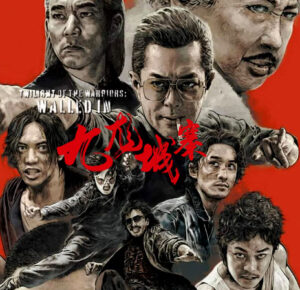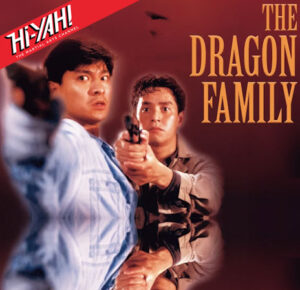
“The Tattoo Connection” American Theatrical Poster
AKA: Hong Kong Connection
Director: Lee Tso Nam
Cast: Chan Lau, Chan Sing, Cheng Fu Hung, Jim Kelly, Kong Do, Tony Leung Siu Hung, Sham Chin Bo, Tan Tao Liang, Wan Faat, Bolo Yeung, Lee Hoi San
Running Time: 90 min.
By Joseph Kuby
Disclaimer: The real title for the film is ‘The Tattoo Connection’ though the UK DVD is called Black Belt Jones 2, even the original theatrical trailers (as seen on the Shaolin Chamber) site call the film The Tattoo Connection.
70s Chop Socky Goodness!
This movie rocks – the tunes, the one-liners, the fights, the nudity, the fashion, etc. It’s easy to see why the Kung Fu boom generated so much interest in the 70s and why we have films like Kill Bill today.
Whilst the movies offered up by the Shaw Bros. film studio and the Golden Harvest film studio were influential, it was the appearance of black martial artists which were vital as they were responsible for maintaining the public interest in the martial arts and the movies they were featured in (people like Van Damme and Seagal, of course, would take over the mantle as far as “western martial artists sustaining western interest in martial arts” was concerned).
The reason for this is that besides the idea of having a western martial artist was a more bankable selling point (think David Carradine in the TV series Kung Fu), these movies were doing enormously well in urban theaters (blacks and other ethnical/cultural minorities could identify with the struggles of the underdog minority) even when the genre started to fade (Jackie Chan mentioned the importance of the black audience when discussing his American debut The Big Brawl, for the UK distributor Hong Kong Legends).
You see, people could actually have heroes to admire through this particular format of casting. Jim Kelly was a natural candidate seeing as how he was in Enter The Dragon (he did for the blacks what Bruce did for the Chinese) and unlike Ron Van Clief, Jim had a solid fan base, charm, good-looks, charisma and decent acting ability (or at least more of a personality). Whilst Ron had the most skills (or chutzpah in technique), Jim had the most presence. Plus Jim had a huge legion of female fans at his feet – something Ron could never take away or pull off on his own terms.
But, nevertheless, the films offered by these two black individuals (along with other stars such as Tamara Dobson, the star of the Cleopetra Jones movies*) helped to bring people like Billy Blanks and, more famously, Wesley Snipes into the mainstream (though it could be argued that after the success of Enter The Dragon, Jim was in a position that even Wesley couldn’t compare to today – even with the Blade films which just goes to show you how popular Jim really was back then).
Of course, you could go so far to say that it’s these black martial arts stars (along with the other Blaxploitation actors & actresses) who helped to give more recognition towards black performers in the film business e.g. Morgan Freeman, Denzel Washington and Halle Berry.
Jim was a natural born athelete so it seems – he was a talented American football player and professional tennis player (he turned professional in 1975 rising to No. 2 in California in the senior men’s doubles rankings and reaching the state’s top ten in senior men’s singles, among other titles). Jim was also a Karate champion (in 1971 he became the international middle weight Karate champ, again among other titles). In fact, Bruce respected Jim so much as a martial artist (Jim had adapted the philosophy and applications of Jeet Kune Do to his training in Karate) that Bruce let Jim choreograph his own fights for Enter The Dragon.
Jim was definately a top-notch martial artist who was almost in the same league as Lee even if they don’t usually or hardly ever share the same space in history books. He could probably have defeated a few of the martial arts stars at the time as he was surprised as to how many of them weren’t really good off screen as they were on – in fact a lot of them couldn’t fight at all (whether this was found out via the result of challenge matches, witness accounts or research is anyone’s guess).
Which leads us to this film, whose true title is The Tattoo Connection and not Black Belt Jones 2 (a film which was financially backed by Warner Bros. and released by one of its distributional companies), as can be seen in the original cinema trailers. The true sequel to Black Belt Jones is a film called Hot Potato.
As the ending indicates, there was meant to have been a sequel to The Tattoo Connection (thus being Black Belt Jones 3) but because of arguments between the two leads (Jim and Dorian Tan Tao-Liang), the idea was scrapped; which is a shame because a sequel to The Tattoo Connection would have been more enticing than a sequel to Rush Hour, much like how The Stranger & The Gunfighter deserved a sequel unlike Shanghai Noon, as there was more ground to explore in terms of ideas.
The failure for a sequel to germinate can be traced back to Jim as he had a tendency to hit people during his fight scenes but didn’t like to get hit back and he didn’t like the idea of his character receiving hits (even simulated ones) as it made him look weak so this lead to arguments with the action director & part-time Bruce Lee imitator, Bruce Liang**.
This made things even more worse – sometimes making production almost slow down to a grinding halt. It’s because of this that any future attempt at making more Hong Kong produced films was also put to a halt as he was virtually blacklisted by the entire Hong Kong film industry.
Unfortunately, this made Warner Bros. think of sending him back to America where the quality of the films became cheap (Tattoo Connection looked more expensive in comparison seeing as how it was a fairly decently budgeted film for Hong Kong standards) and so his entire film career came to a halt therefore he was never really allowed to show the full extent of his acting and martial arts prowess (I don’t think he ever went back into the American football business either).
It’s kind of a shame because if Warner Bros. had thought of enlisting the talents of the Shaws or Golden Harvest and got them to work with Kelly under legal circumstances (like buying the rights to the companies) or enticing them through financially profitable circumstances (where the pay cheques would be more higher than usual for the HK filmmakers thus being able to get them to sign ironclad contracts) then Jim would be seen as one of the best Westerners to perform HK style action (yes, being ranked alongside people like Gary Daniels, Mark Dacascos and Cynthia Rothrock rather than below them). If any of these actions took place then we could have seen Jim work with someone like Lau Kar Leung, Sammo Hung or even Yuen Woo Ping (who was associated with Ng See Yuen’s Seasonal at the time).
In fact, Sammo Hung had done a film which was a parody of Bruce Lee’s Way Of The Dragon called Enter The Fat Dragon, it was in this film which had a Chinese Kung Fu master dressed up as a black Karate exponent with laughable results so maybe Jim Kelly could have provided some much needed authenticity (though it could be argued that Sammo was lampooning the stereotypes of black martial artists*** as well as the western filmmaking psyche, despite how implausible that sounds).
The only people in this film who would continue to collaborate on future films would be Bolo Yeung and Chiang Tao – the latter of whom practically appeared in almost every film Bolo did, or the Bruce Le films to be more precise. They must have been great buddies!
Bolo Yeung would also go on to collaborate with Dorian for this American production called Breathing Fire (Dorian was credited as Delon Tanners), which starred Jerry Trimble (and get this….his character is called Michael Moore) and Jonathan Ke Quan (the Vietnamese kid who appeared in Indiana Jones & The Temple Of Doom and The Goonies). Jonathan would go on to work with Corey Yuen on The One and X Men (acting as assistant fight choreographer and translator for Corey).
But back to Tattoo Connection, equally famous faces appear in this film like Lee Hoi San and the HK Rowan Atkinson, Wong Yat Fei****, playing a detective investigating a homicidal case relating to the plot of this movie. It was quite bizarre to see him in such a serious role, it’s like if we saw Rowan in an episode of The Sweeney or something.
The film itself is a classic, it’s truly one of the best films of the 70s – a fairly involving plot with twists, it’s fun, not pretentious and not afraid to poke fun at itself. A sequel was undoubtedly needed as Jim and Dorian make a good team which outclasses the pairing made by Jackie and Chris for the Rush Hour films. Sure, the former pair may have lacked the glitz & glamour of the latter pair, but they had more grit & grime which is needed for a truly hard-boiled crime thriller with bone-crunching martial arts action. Which reminds me, the ending for this motivated Ratner to follow suit for the ending of Rush Hour i.e. at the end of Tattoo Connection, Jim Kelly is in the Hong Kong Airport just about to head back to America and is having a conversation with Tan Tao-Liang. In the conversation it crops up that Tan Tao-Liang’s character is going to America on holiday in a couple of weeks of time.
It’s interesting how some of the original music cues from other Kung Fu films had found their way into this movie (considering the origins of where they came from and given that this is a contemporary outing) like Drunken Master (e.g. the music cue from Drunken Master whenever we see the assassin played by Hwang Jang Lee) as well as other flicks like Half A Loaf of Kung Fu (starring Jackie Chan) and Dirty Tiger Crazy Frog (starring Sammo Hung). We have a song here by Anders Nelsson called Diamond which is quite snazzy despite not being on par with the one he composed for Dragon Lives, however his song (and the score in general) gives the film a level of coolness unparalled by most films of the period. The theme song isn’t as cool or magnificently composed as the themes constructed for Shaft and Goodbye Bruce Lee: His Last Game of Death, but it succeeds in opening this film with a bang!
This film is cool because we get to see Jim Kelly take on Bolo Yeung in two fights which makes up for the missed opportunity in Enter The Dragon (Jim was supposed to have lived and John Saxon was the one who was supposed to have died, but John’s manager ‘reasoned’ someone of John’s star power in comparison to someone of Jim’s newbie status shouldn’t be allowed to die) so we never got to see a lengthy fight between them in that film but it’s sort of made up for in here as we see two short bouts between them.
Tan Tao-Liang is slightly more impressive as he’s able to hold his leg in the air than Kelly (like as if he was doing the splits), and flashing his legs at the same time hence his nickname ‘Flash Legs Tan’.
However Jim surprises the viewer halfway into the movie as his second fight with Tan features astonishingly more higher kicks than usually expected of our afro wonder. Also he impressively demonstrates 90% of the talent Tan has by doing six kicks with one leg within one shot without letting his foot touch the ground!
This movie could be technically labelled as Bruceploitation, you have Connection in the title*****, Bolo (who teams up with Bruce Le associate Chiang Tao and, of course, who was in Enter The Dragon) and Jim is being touted as being a black Bruce Lee (the philosophy, the double sticks – even the trailer says it). Lee Tso Nam was probably hired for his affiliation with Bruce Lee (assistant directorial duties for Big Boss and directing several Bruceploitation flicks) as much as he was hired for his stand-alone merits (directing commercially successful films like Eagle’s Claw, Chinese Kung Fu Against Godfather {which showed his ability to handle Western actors} and ‘The Hot, The Cool & The Vicious’).
As you can tell from what I’ve said above, there’s a distinct and overflowing level of ‘coolness’ emanating from the movie. It really achieved a ‘wow, I want to be as cool as him’ feel, which few other movies can telegraph without blatant product placement and pathetic attempts at wannabe hipness (like the recent movies involving Hong Kong pop idols {or any movie with MTV-bred idols for that matter} where you have guys like Edison Chen putting on thick layers of cheese with sorry piss-poor, lame-ass one-liners like “sup dog” and “naw man, I’m cool, you know how it is”).
One of the greatest things about this film is that it knows what it is, it doesn’t try to be something that it’s not and it doesn’t try too hard to mix genres.
Whilst there’s nothing wrong with ambition, not every single film can be a masterpiece or even a classic for that matter – sometimes simplicity is the order of the day. Though having said that, this film contains almost everything except shootouts though that kind of takes away the point of the movie (even though to be fair, guns weren’t as equally accessible in Hong Kong back then as they were in America, though even in today’s era HK thugs still don’t pack the arsenal US criminals do, instead using knives, choppers and machetes with the occasional gun or two – don’t let John Woo’s HK outings fool you).
It rivals Enter The Dragon as the 70s martial arts/Hong Kong equivalent to Commando as there’s lots of juicy one-liners peppered throughout. The following exchange is funny in the way Jim tries to get back at Tan without losing his cool…
Tan: Black man, you were lucky this time!
Jim: Yellow man, you won’t get away……the NEXT TIME!
Which brings us to the script, it was written by E. Charles McBroom (E stands for Edward) who is also an international film producer (he produced this film too). He was the one responsible for producing Half A Loaf of Kung Fu (though he went uncredited) as well as producing Lau Kar Leung’s 18 Legendary Weapons Of China (for which he lent his dialogue-writing skills to), Lee Tso Nam’s The Leg Fighters, Monkey Kung Fu (which starred Tony Ching Siu Tung and had dialogue co-written by Edward), Dirty Kung Fu (made by the Lau brothers and co-scripted by Ed, of whom did some ghost directing), Death Duel of Kung Fu (which starred John Liu and Don Wong Tao) and the legendary ninja classic The Ninja Hunter (a.k.a. Wu Tang vs. Ninja). He helped to edit Lee Tso Nam’s classic Eagle’s Claw and he helped write the dialogue for Hwang Jang Lee’s directorial debut, Hitman In The Hand Of Buddha. He’s still feverishly involved in filmmaking today.
This film is a prime example of shouting out “CLASSIC” when ever something funny or cool happens like when Jim dances with this naked chick in this funky scene (with equally funky, if cornball, music) where he tries to seduce her.
There’s a nice reference to Star Wars in this film with two characters sharing George Lucas’ name (Edward’s scripts have quirks similar to this). Jim is called Lucas and Norman Wingrove’s character is called George.
Speaking of whom, Wingrove (whose character in this film is one of Jim’s contacts) has been a resident of Hong Kong for more than thirty years. He produced and presented a nightly radio program on information technology for several years in the 1980s and has written on IT and telecommunications for a range of Hong Kong and overseas publications for over more than a decade. Since 1995 Norman has designed websites for a number of companies and industry organizations (Jeff, hook up with this guy, hehe) and through his company, Kintak Enterprises Limited, provides a variety of writing and editorial services. Wingrove developed and maintained the TRP (Telecommunications
Research Project) website and its companion site at the Telecom Infotech Forum. For four years he edited the monthly newsletter of the Hong Kong Telecommunications Users Group (HKTUG) and also built and maintained its website until 1999. In March 2005 he was asked to resume responsibility for the site and has now completely rebuilt it and included the facility for HKTUG personnel to update the pages themselves online.
As an actor, Norman Wingrove’s not bad in this movie and he would have equally have found success working in British cinema or anywhere else for that matter.
Like what the trailers say (which can be found on the Shaolin Chamber website), Jim Kelly is definitely a mix between Bruce Lee and James Bond******. Though Lucas sees himself as the black six million dollar man!
The Tattoo Connection is funny too. There’s a scene where Jim flirts with this Chinese woman and when he proposes a date to her, he looks slightly menacing with his open eyes, maniacal grin and the way he looks below her eyes (the part of the body you can figure out for yourself) after he says “I hope we can be friends.” When she agrees Jim does a slight giggle (probably a result of the dubbing than the acting on location) before saying “That’s beautiful, let’s go then!”
Hey, any movie which has songs courtesy of Suzi Quatro (in this case – Can The Can and 48 Catch) is okay by me!
A true classic if there ever was one, let alone cult classic (something this film should also be labelled as, seeing as how it is pure dynamite exploitation entertainment that’s only appreciated by a select few).
Definately one to watch at social occasions with mates and a couple of brews, especially at clubs or pubs!
Highly recommended!
* The second film of said series which was set in Hong Kong with Matrix action-director Yuen Woo Ping acting as fight choreographer and who even appeared in the film.
** According to John Richards, owner of the Wasted Life site, apparently Bruce (a.k.a. Leung Siu Lung – The Beast from Kung Fu Hustle) was someone you wouldn’t want to mess with. Toby Russell told John that there are plenty of stories of Bruce getting into fights (after starting them) on film sets and nightclubs. Toby also told him that he saw Bruce in a Hong Kong nightclub with his entourage and was going to go over to introduce himself. However Toby’s mate stopped him because they were both drunk and probably would have been beaten up.
*** Another possibility was that Sammo was taking a swipe at the black martial artists setting themselves up as the black equivalents to Bruce Lee Siu Lung (Bruce, the little dragon – his birth name). In fact the fight between Sammo and Lee Hoi San could be connotated as a black martial artist trying to out-Bruce Bruce!
**** He can be seen in Stephen Chow’s films, his most famous role was as Iron Head in Shaolin Soccer (basically the guy who is forced to wear underwear on his head).
***** But then again so did French Connection, Italian Connection, Korean Connection, Snuff Bottle Connection, Gold Connection, Amsterdam Connection and numerous other ‘Connection’ movies. Fuck, there’s even a Bruce Le flick called Cameroon Connection (it’s meant to be the most bizarre and worst flick out of the Bruceploitation cannon)!
****** Although he falls short of the Japanese name given for Bond – Mr. Kiss Kiss Bang Bang, as he never fires a firearm.
Joseph Kuby’s Rating: 10/10























Be the 1st to Comment